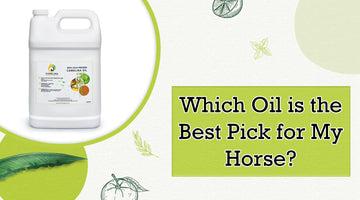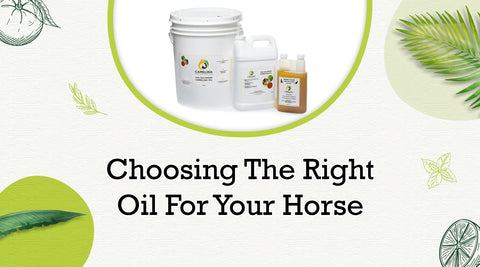
If you have a horse, providing it with the right nutrients should be your top priority. In order to keep its energy levels and omega-3 levels up, we at Camelina Gold suggest that adding oil to its diet is the key because horses can’t make these fats on their own.
Choosing an oil higher in omega-3 than omega-6 will be crucial to ward off inflammation and health problems. While various other available oils may help your horse, we suggest Camelina Equine Oil above others.
1. Flaxseed Oil
Known for its high omega-3 content, flaxseed oil can be beneficial for horses' overall health and shiny coats. However, it may become stale quickly and lose its effectiveness if not stored properly.
2. Corn Oil
Corn oil is readily available and affordable oil, making it a common choice for horse owners. However, it contains higher levels of omega-6 fatty acids compared to omega-3, which may contribute to inflammation if not balanced with other oils. While it can provide a quick energy boost for horses, it's essential to consider its omega-6 content when incorporating it into their diet.
3. Fish Oil
Rich in omega-3 fatty acids EPA and DHA, fish oil can support joint health and reduce inflammation in horses. However, it may not be as appetizing to some horses and can be expensive compared to other options. Despite its benefits, some horse owners may find it challenging to administer fish oil consistently to their equine partners.
4. Camelina Oil
Camelina Equine Oil stands out for its optimal balance of omega-3 and omega-6 fatty acids, making it an excellent choice for promoting overall health and wellness in horses. Its high stability and palatability make it easy to incorporate into your horse's diet, ensuring they receive the essential nutrients they need for optimal performance and well-being. Additionally, Camelina Equine Oil contains natural antioxidants, which can further support your horse's immune system and overall vitality. With its numerous benefits and few drawbacks, Camelina Equine Oil emerges as a top pick for horse owners looking to enhance their horse's diet and well-being.

Choosing the Right Oil for Your Horse
Selecting the best oil for your horse is crucial for maintaining its health and well-being. Here are the key considerations that you must look at before getting the oil:
1. Dietary Requirements
Understanding your horse's dietary requirements is essential when choosing an oil. Look for oils that provide the necessary nutrients, such as omega-3 fatty acids, which play a vital role in supporting your horse's overall health, including joint function and coat condition.
2. Quality
Buy oils that are of the highest quality to ensure your horse receives maximum nutritional benefits. Look for oils that are cold-pressed or minimally processed, as these methods help retain the oil's nutritional integrity. Additionally, choose oils sourced from reputable suppliers and free from additives, fillers, and solvents to ensure purity and effectiveness.
3. Palatability
Palatability is key to ensuring your horse readily consumes the oil. Choose oils that are palatable and appealing to your horse's taste preferences to encourage consistent intake. Some oils may have added flavors or aromas to enhance palatability and make them more enticing to your horse.
4. Cost
You should consider the cost-effectiveness of the oil while balancing its quality and benefits. While it's essential to invest in high-quality oils for your horse's health, ensure they fit within your budget and offer good value for money. Compare prices across different brands and types of oils to find the best option for your horse.
5. Consultation
Consult with your equine veterinarian or equine nutritionist when selecting an oil for your horse. They can provide valuable insights and recommendations based on your horse's individual needs, health status, and dietary requirements. Additionally, they can also offer guidance on proper dosage and integration of the oil into your horse's diet for optimal results.
Conclusion
Selecting the right oil for your horse is a critical decision that can significantly impact its health and well-being. With its exceptional nutritional profile, palatability, and quality, Camelina Omega Equine Oil emerges as an ideal choice for supporting your horse's overall health, from promoting joint function to enhancing coat condition.
To buy the best quality Camelina Omega Equine Oil, visit us at Camelina Gold.
FAQs
It's generally not recommended. Opt for equine-specific oils like Camelina Oil to ensure proper nutrition and avoid potential additives or flavors harmful to horses.
A general guideline is 1 ounce of oil per 200 pounds of equine body weight daily. For personalized advice, consult with a veterinarian who can consider your horse's specific needs.



